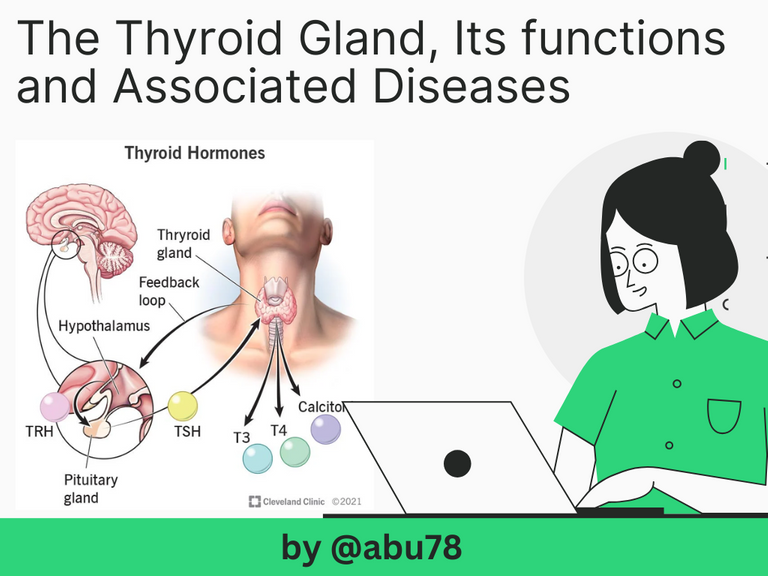The Thyroid Gland, Its functions and Associated Diseases
Greetings to all and sundry on this platform once again. As a biochemistry student, I researched "The Thyroid gland, its function, and associated diseases" today and decided to share it with you guys here. I hope that you will enjoy it and also learn from it. Stay tuned with me as I discuss this topic in my article.

The thyroid gland is an endocrine gland that is situated in front of the neck below the voice box. It produces hormones responsible for regulating certain activities in the body. Two hormones are produced by the thyroid gland which includes thyroxine (T3) and triiodothyronine (T4).
The thyroid gland is responsible for regulating metabolism, body temperature, hormone levels and also regulating heartbeat. Generally, the basic function of the thyroid gland is to provide hormones that are responsible for regulating metabolism. The thyroxine and triiodothyronine hormones are responsible for producing energy for the body and also generating energy from food for the body.
These two hormones are also responsible for controlling blood sugar levels, maintaining electrolyte balance, and also the production of essential nutrients for the body. We can’t talk about the thyroid glands without mentioning how important it is to the mental, and physical development of humans.
These two hormones also help in the reproductive system as well as in growth development. They function in regulating memorial periods in females and also control healthy bones and muscles.
Thyroid glands also help to regulate the level of calcium by the production of calcitonin which aids in doing that. This calcitonin produced helps to reduce the risk of osteoporosis.
With all the above functions mentioned, there can be situations where diseases attack this organ. These diseases occur as a result of the overproduction of thyroid hormones or insufficient production of thyroid hormones in the body. We call it hyper-secretion or hypo-secretion. When too much or overproduction of thyroid hormones occurs, it can lead to a disease called hyperthyroidism and when too low or insufficient thyroid hormones are produced, it is termed hypothyroidism.
Other diseases related to the thyroid gland include goiter. Goiter occurs when there is an inflammation of the thyroid gland as a result of the formation of lumps in the thyroid gland. Symptoms of improper functioning of the thyroid glands include; dry skin, joint pain, fatigue, difficulty in sleeping, weight gain or loss, hair loss, muscle aches, depression, and constipation.
When an individual is diagnosed with hyperthyroidism, the doctor aims to find ways of reducing the overproduction of thyroid hormones, which can be achieved through surgery, and or medications. Conversely, an individual diagnosed with hypothyroidism would be needed to increase the production of thyroid hormones in his system to balance this condition. It is very necessary to always seek the advice of your doctor whenever you realize you have any malfunctioning in your thyroid gland.
The thyroid gland is a very small but vital organ of the human system as it performs important functions in the human body. We need to try and take good care of it and always go for check whenever we detect something strange happening with our thyroid gland for early screening.
The references given below are sites where you can learn more about the thyroid gland, its structure, and its function.
Reference 1
Reference 2
Reference 3
